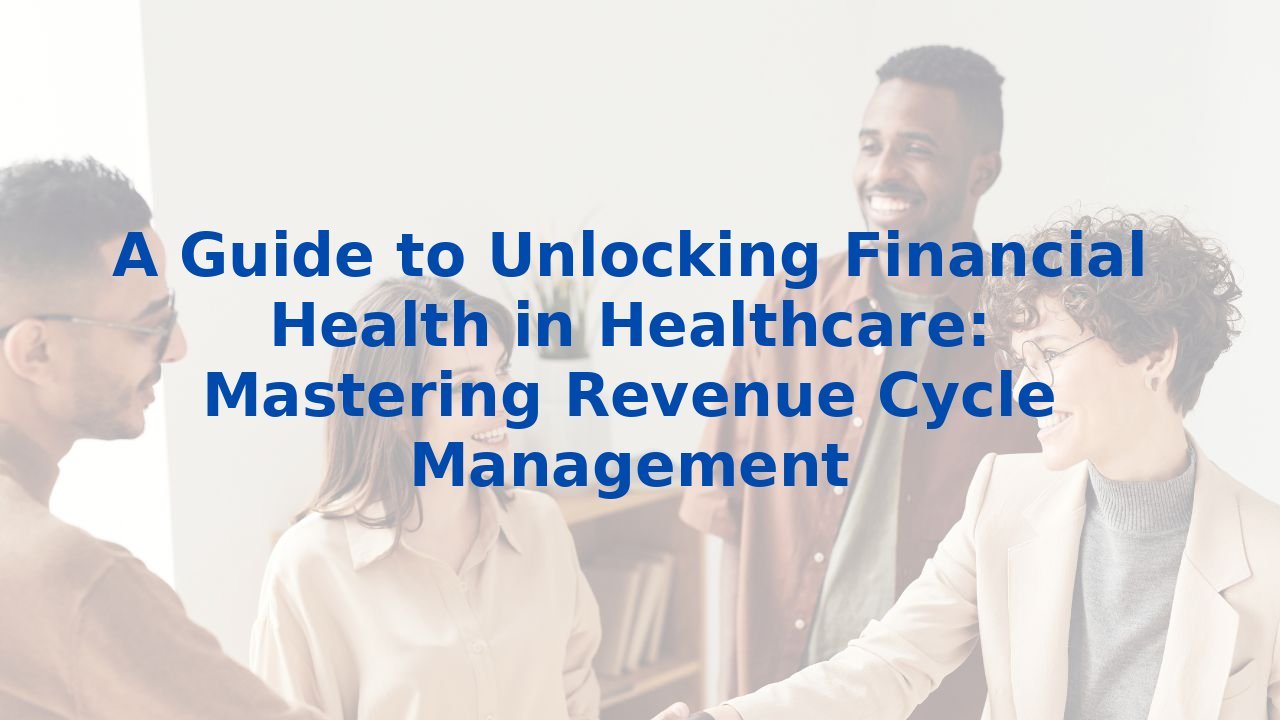A Guide to Unlocking Financial Health in Healthcare: Mastering Revenue Cycle Management

A Guide to Unlocking Financial Health in Healthcare: Mastering Revenue Cycle Management
In today’s ever-evolving healthcare landscape, mastering revenue cycle management (RCM) is more critical than ever. With margins tightening and regulatory complexities increasing, the integration of innovative technologies, particularly artificial intelligence (AI), can significantly enhance financial health. This guide explores how RCM processes function and how AI can unlock their potential, resulting in improved efficiency and overall organizational success.
Understanding Revenue Cycle Management
Revenue cycle management is the process of managing the financial transactions between a healthcare provider and its patients, from the moment a patient schedules an appointment to when the final payment is collected. It includes patient registration, insurance verification, coding, billing, and collections. Each of these processes must work harmoniously to ensure that revenue flows smoothly, minimizing delays and denials.
Key Processes in Revenue Cycle Management
There are several pivotal components involved in RCM:
- Patient Registration: This first step involves gathering essential information about the patient, including insurance details and demographics, ensuring a smooth transition into treatment.
- Insurance Verification: Confirming eligibility and coverage levels before services are rendered lays the groundwork for a hassle-free billing process.
- Medical Coding: Proper coding is critical. Accurate codes determine reimbursement rates and compliance with regulations.
- Billing and Collections: Generating accurate bills and actively pursuing payments through a streamlined collections process secures revenue efficiently.
How AI Transforms Revenue Cycle Management
AI has the potential to revolutionize these crucial RCM processes, offering unmatched insights and efficiencies.
1. Enhanced Data Accuracy
Errors in patient registration and coding can lead to claim rejections and revenue loss. AI can automate data input, learning from past corrections to predict and prevent future mistakes. This ensures that patient information is consistently accurate when claims are submitted.
2. Streamlined Insurance Verification
AI can automate the insurance verification process by quickly cross-referencing patient information with insurance databases. This rapid verification leads to fewer delays in treatment and more efficient claim submissions, ultimately enhancing cash flow.
3. Intelligent Coding Assistance
With AI's capacity for processing vast amounts of data, coding accuracy improves dramatically. AI systems can flag discrepancies and suggest appropriate codes based on treatment details. This not only speeds up the coding process but also minimizes errors that can lead to denials.
4. Optimized Billing and Collections
AI algorithms analyze billing data in real time to identify trends in payment delays and patterns in denials. Automation in follow-ups for overdue accounts increases recovery rates while minimizing the workload for billing departments.
Benefits of AI in Revenue Cycle Management
Integrating AI into RCM offers a multitude of benefits, creating a more streamlined and effective operation.
- Improved Decision-Making: AI empowers healthcare administrators to make data-driven decisions quickly, using insights gathered from real-time analysis of revenue cycle performance.
- Increased Operational Efficiency: Automating mundane tasks means staff can devote their time to more strategic initiatives, including patient care and relationship building.
- Reduced Costs: By cutting down on manual processes, healthcare organizations can save significantly on operational costs, strengthening their overall financial health.
Setting the Stage for Successful AI Integration
While AI’s potential is vast, the success of its integration relies heavily on employee training. Here’s why fostering a culture of learning is vital:
Maximizing AI's Potential
When employees are trained to work effectively with AI systems, they can fully leverage its capabilities to enhance their workflows. This ensures that the technology complements human expertise rather than replacing it.
Promoting Collaboration
Training encourages a symbiotic relationship between humans and AI, where each reinforces the capabilities of the other. This collaboration leads to improved outcomes in patient care and operational success.
Mitigating Ethical Concerns
Proper training addresses potential ethical concerns associated with AI use, ensuring that all staff members understand the importance of data privacy and the ethical implications of their actions.
Conclusion
Mastering revenue cycle management in healthcare is essential for maintaining financial viability in a demanding environment. By integrating AI into key RCM processes, organizations can improve efficiency, enhance data accuracy, and ultimately safeguard their financial health. Investing in comprehensive employee training will ensure the successful implementation of AI, creating a workforce ready to harness the power of technology for better healthcare outcomes.
To further explore how AI can transform your organization, consider exploring resources that delve deeper into AI applications specific to healthcare.